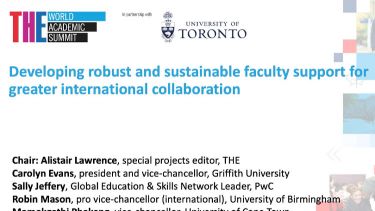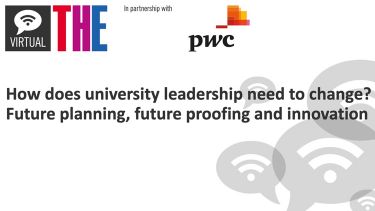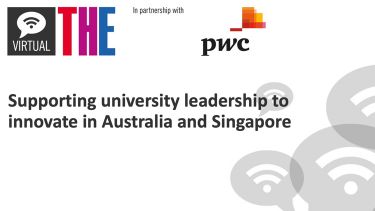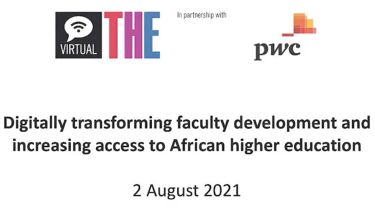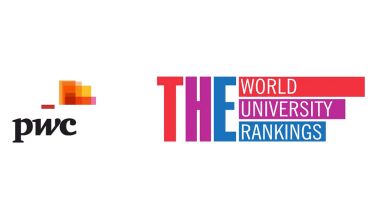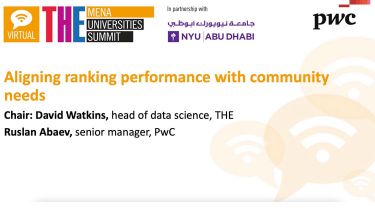With students increasingly worried about their employment prospects, university leaders face a challenge to produce industry-ready graduates
Universities should reassess and redesign curricula and enhance engagement with industry to ensure graduates receive the skills they need to thrive in the future workforce.
A Times Higher Education roundtable, held in partnership with PwC, brought together academics and industry experts to discuss how to support university faculty leadership in the Middle East.
Chair Alistair Lawrence, special projects editor at THE, asked how the region’s universities could adapt curricula and delivery models to maximise student success and employability while supporting faculty to deliver those changes.
David Sadler, provost at the University of Birmingham Dubai, said the Covid-19 pandemic had changed the mode of delivery across higher education. The University of Birmingham Dubai had moved towards “bimodal delivery”, combining online and face-to-face learning.
“A downside, of course, is it’s a different kind of student experience. But an upside is it makes you question the way you’ve designed the curricula, the content of the curricula, and to make sure the learning objectives really are fit for purpose,” Professor Sadler said. “In a sense, what we’ve done is turn the experience of the last 12 to 18 months into an opportunity, to review the learning objectives of our students and the programmes we deliver.”
A PwC survey asked senior higher education leaders in the Middle East about their experience of the transition. The responses suggested that universities had made a positive start in this transition. Eighty-nine per cent reported that their institution was doing well or very well in adapting curricula and delivery models to maximise student success and employability.
In recent years, students have become more concerned with their graduate employment prospects, according to Hassan Barada, acting dean for the College of Engineering at Khalifa University.
As a result, there has been greater engagement with industry, both locally and internationally. As well as workshops focused on skills such as interviewing and CV writing. The university’s engineering students, for example, now complete 16-week internships, up from eight weeks.
The PwC survey found that 44 per cent of respondents thought their institution was doing a good job of strengthening partnerships with industry to become more internationally competitive.
Kevin Mitchell, chancellor of the American University of Sharjah, said future employability must not only focus on the technical skills all graduates should gain. “For us, it’s more a conversation around what is that differentiator beyond the baseline of the major the student is enrolled in,” he said.
“Discussions about employability often tend to focus on that first job after graduation, versus a more long-term view of educating students and knowing that jobs are going to change, some tremendously.”
The panellists agreed that giving universities more opportunities to commercialise research would spur on researchers and attract high-quality faculty to the Middle East. Eighty-eight per cent of the respondents to PwC’s survey said their institution was doing well or very well in encouraging entrepreneurialism with more innovative and sustainable research.
Ayesha Abdullah, acting vice-president of academic affairs and executive dean of business at Higher Colleges of Technology (HCT), the UAE’s largest applied higher education institution, said commercialising research innovation was a key focus.
“We also have an innovation centre where we want to take the ideas of students and help make them commercial with the support of faculty,” she said. “We have about 25 companies that are registered and are operating in our incubators and accelerators.”
Roland Hancock, partner at PwC’s education practice in the Middle East, said universities would need to recognise industry demands in a post-Covid world. “We’ve been using technology to try and understand what skills are going to be required in the future...to figure out what employers are going to want,” he said.
In addressing curricula relevance, AUS commented on how the pandemic had made it easier to integrate working professionals into the classroom and had been running workshops with HR professionals. Abdullah also mentioned that HTC has plans to expand its adjunct faculty. All the panellists identified the need for the regulators to embrace more flexibility in the definition of faculty roles.
Sally Jeffery, global education and skills network leader at PwC Middle East, said with workers expected to regularly refresh skills in a disrupted workforce, there was a “tremendous opportunity” for universities “to maintain that connection with their alumni and offer that lifelong learning contract”.
When asked what leadership skills they would like their faculty to improve as a priority, there was clear consensus from the panel that learning to be better communicators and more empathetic towards students and colleagues was important.
The panel:
- Ayesha Abdullah, acting vice-president of academic affairs and executive dean of business, Higher Colleges of Technology
- Hassan Barada, acting dean, College of Engineering, Khalifa University
- Roland Hancock, partner (education), PwC
- Sally Jeffery, global education and skills network leader, PwC Middle East
- Alistair Lawrence, special projects editor, Times Higher Education (chair)
- Kevin Mitchell, acting chancellor, American University of Sharjah
- David Sadler, provost, University of Birmingham Dubai
Watch the webinar on demand above or on the THE Connect YouTube channel.
Find out more about PwC.

